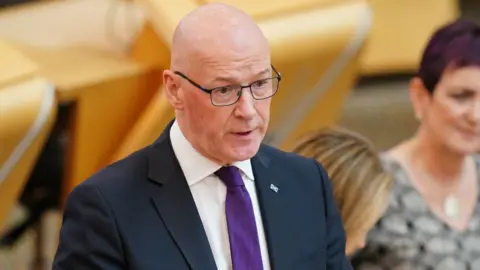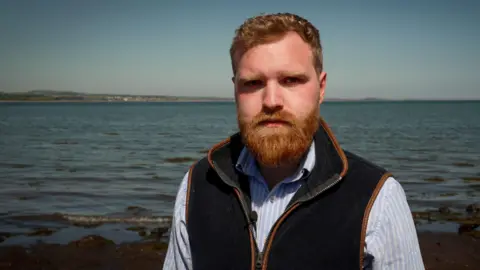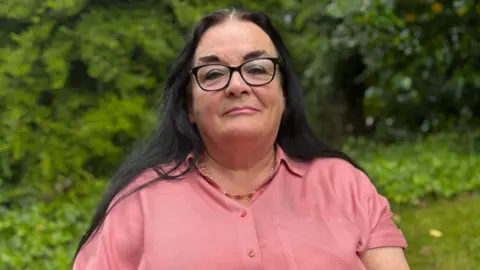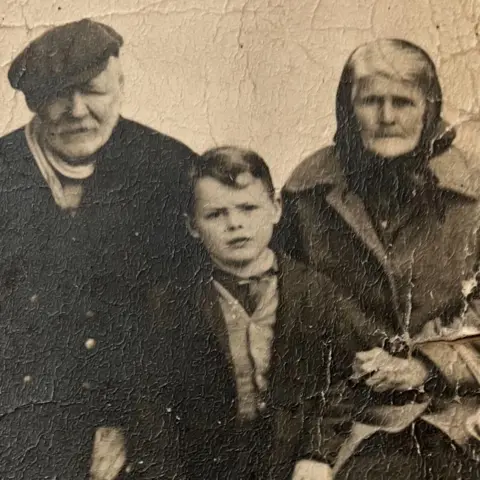Swinney apologises to travellers for 'Tinker Experiment'
 PA Media
PA MediaFirst Minister John Swinney has apologised for a state-sanctioned social experiment on Scotland's Gypsy Travellers.
In what is known as the "Tinker Experiments", which ran from the 1940s to 1980s, authorities aimed to "settle" travellers by forcing them to leave their lives on the road for permanent settlements.
It involved parents being threatened with having their children taken from them and put into care if they refused to leave their settlements on roadsides.
Swinney said sorry for the "injustice and prejudice" of the historic policies, the impact of which he said was still felt today.
'Unfair and unjust'
In a statement to parliament, the first minister said: "It falls to this government to state without ambiguity that what happened to Gypsy Traveller communities was unacceptable.
"It is clear to the government that stark prejudice and lack of cultural awareness led to a series of unfair and unjust policies.
"These policies resulted in children being removed from their families and families were forced to live in sub-standard accommodation and degrading conditions."
Swinney told MSPs: "The Tinker Experiments should not have happened. Those policies were wrong and we recognise it is still hurting so many today."
He said: "On behalf of Scotland, we are sorry."
The SNP leader added that although Scotland had "come a long way since the Tinker Experiments", there was "still much to do" in tackling the prejudice the community continued to face.
Swinney's statement coincided with the publication of an independent report by academics at the University of St Andrews into the experiments.
One of the report's authors, Prof Ali Watson, told BBC Scotland News a range of policies had led to discrimination and dehumanisation, amounting to "cultural genocide" against Gypsy Travellers.
The report, commissioned by Holyrood ministers, found that the UK government's Scottish Office, as well as churches, charities, local authorities and police, were complicit in facilitating forced assimilation, resettlement and the removal of children.
Travellers were housed in accommodation including huts, repurposed military buildings and disused properties, the report added - with these "known by government agents to be substandard" with such properties "frequently without" electricity and running water.
The academics said traveller children were placed into care, forced to attend industrial schools or adopted by non-traveller families in Scotland and overseas.
The report recommend that the Scottish government, as the body now responsible for the issue, gives an apology and considers paying compensation to those affected.
The Church of Scotland also issued "a heartfelt and genuine apology for these historic wrongs".

The university report's findings have been explored in a BBC podcast called The Cruelty - Stolen Generations, presented by Davie Donaldson, who comes from the traveller community.
He told BBC Scotland News: "The belief was that if older travellers were forcibly settled, they would forget about their culture.
"And as the generations went on the younger travellers could be boarded out or placed in institutions and be brought up as non-travellers, and by doing that they would eradicate the culture.
"It really is a really dark period in Scottish history and one that sadly few people have heard of until today."
Members of Scotland's traveller community have been campaigning for an apology for their treatment for years.
Efforts to "assimilate" travellers into Scottish society were first documented in the late 1800s, with the authorities aiming to force them into "normal" housing.
Gypsy Travellers were settled on sites across Scotland, including in Aberdeenshire, Argyll, Highlands, Perthshire, Fife and the Borders.
It is not know precisely how many were forced from this life, or how many children were forcibly removed.
Martha Stewart, 67, was forcibly removed from a Scottish traveller camp when she was six months old and eventually adopted by a non-traveller family.

Speaking ahead of the statement, Ms Stewart said she would be "very happy" with a formal apology "because it would mean to me that they actually acknowledge that it happened".
She told BBC Scotland News: "You are talking about families being ripped apart."
Ms Stewart added: "It's part of your identity and it was taken away from you.
"And if you don't find it, or can't find it ever, part of you is missing."
 Martha Stewart
Martha StewartScottish Conservative MSP Alexander Stewart welcomed the "long overdue" apology.
He questioned why it had taken so long and asked if the government was considering compensation for those affected by the experiments.
Labour's Paul O'Kane also welcomed the statement, apologised on behalf of his party and called for clarity on financial redress.
Swinney said the government did not have immediate plans for a redress scheme but added ministers would engage further with the traveller community.
